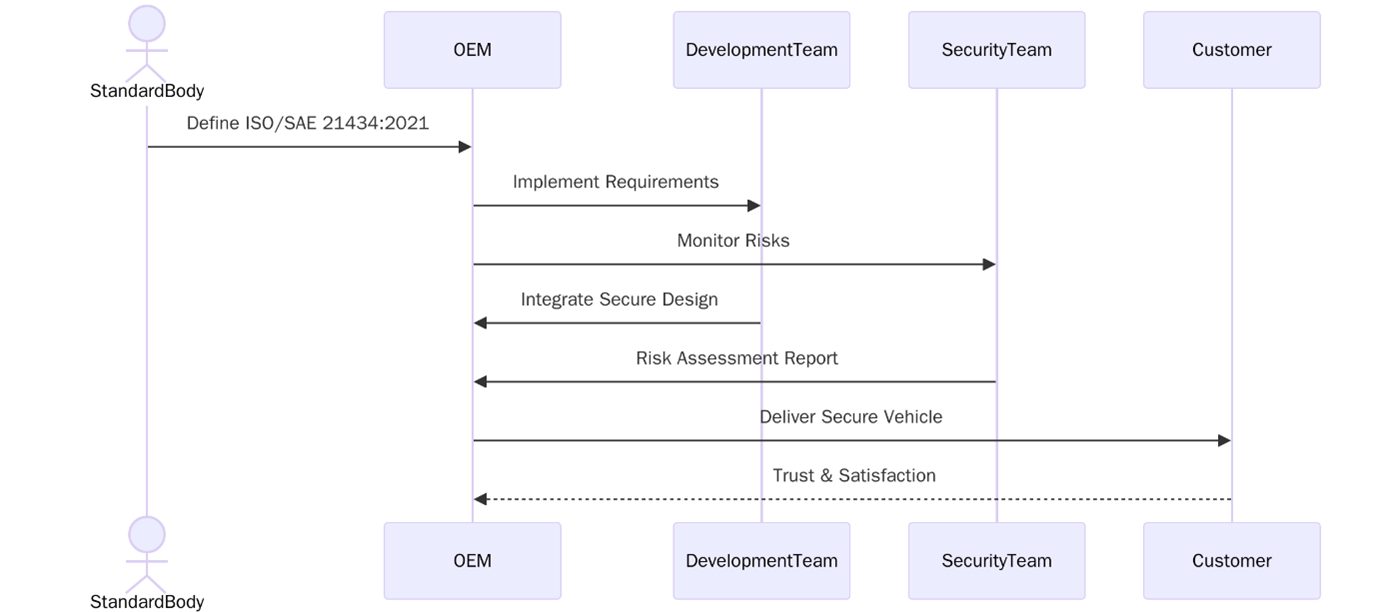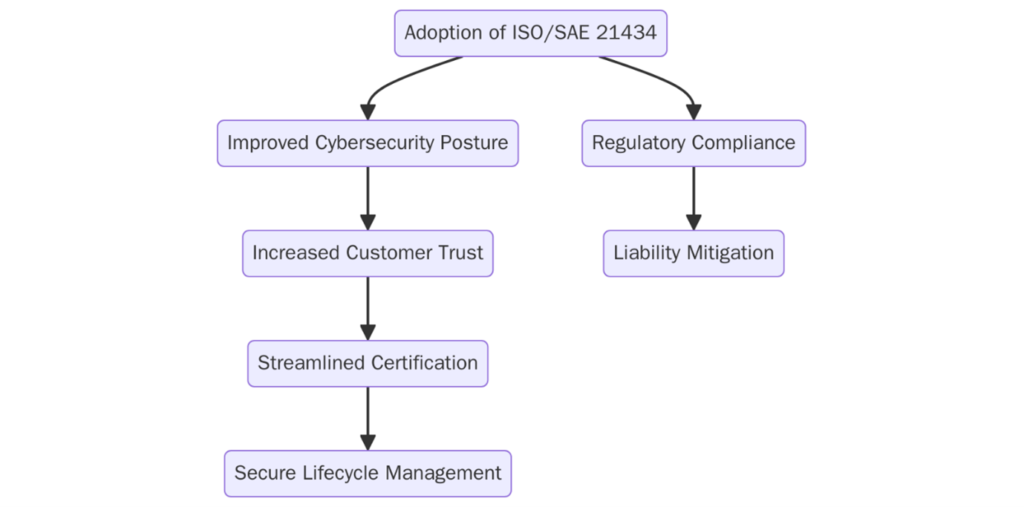What is ISO/SAE 21434?

ISO/SAE 21434:2021 is the definitive international standard for cybersecurity risk management in road vehicles. Developed by the International Organization for Standardization (ISO) and SAE International, it establishes a framework for cybersecurity engineering throughout the lifecycle of electrical and electronic (E/E) systems in vehicles.

With the rapid evolution of connected, automated, and software-defined vehicles, new cybersecurity threats have emerged, affecting everything from braking systems to over-the-air updates. ISO/SAE 21434:2021 is designed to help automakers and suppliers ensure that cybersecurity is embedded into vehicle development and maintenance, reducing risks of cyberattacks and protecting vehicle safety, privacy, and performance.
If you are looking for ISO/SAE 21434:2021 compliance audits or assessment, contact us at support@pacificcert.com.
Purpose of ISO/SAE 21434
The primary objectives of ISO/SAE 21434 are to:
- Define standardized processes, roles, and activities for automotive cybersecurity
- Provide a risk-based approach to managing cyber threats in vehicle systems
- Ensure cybersecurity is addressed from concept to decommissioning
- Support compliance with UNECE WP.29 regulations, especially UN R155 on Cybersecurity and UN R156 on Software Updates
- Promote secure-by-design principles and proactive threat management
- Enable traceability and accountability throughout the vehicle supply chain
Scope and Applicability
Scope:
ISO/SAE 21434:2021 applies to all E/E systems in production road vehicles, excluding two-wheelers, including hardware, software, communications, and interfaces. It covers the entire lifecycle—from development and production to operation, maintenance, and decommissioning.
Applicability:
- Vehicle OEMs and manufacturers of connected and autonomous vehicles
- Tier 1, Tier 2, and Tier 3 suppliers
- Developers of embedded software and E/E systems
- Tool providers, testers, cybersecurity engineers, and systems integrators
- Consultants and auditors supporting compliance with UN regulations
ISO/SAE 21434 deals with embedded, safety-critical systems directly related to vehicle function and safety.
Key Definitions
- Cybersecurity: The condition of being protected from unauthorized digital access or attacks that affect confidentiality, integrity, availability, and authenticity.
- TARA (Threat Analysis and Risk Assessment): A formal process to identify potential cyber threats, assess risks, and define mitigation strategies.
- CSMS (Cybersecurity Management System): A structured system used to manage and govern cybersecurity activities across the organization and its products.
- Assets: Components or systems (ECUs, CAN buses) that need protection from cyber threats.
- Vulnerabilities: Weaknesses in a system that could be exploited by a threat actor.
If you are looking for compliance support for ISO/SAE 21434, contact us at support@pacificcert.com!
Clause-wise Structure of ISO/SAE 21434
Clause / Part | Title | Summary |
1–3 | Scope, References, and Definitions | Introduces the standard’s purpose, application, and glossary. |
4 | General Considerations | Explains key concepts, such as assets, risks, threat modeling, and cybersecurity goals. |
5 | Organizational Cybersecurity Management | Defines company-wide cybersecurity governance, policies, and responsibilities. |
6 | Project-dependent Cybersecurity Management | Addresses project-specific planning, roles, and resource allocation for cybersecurity activities. |
7 | Distributed Cybersecurity Activities | Covers information sharing and collaboration between OEMs and suppliers. |
8 | Continual Cybersecurity Activities | Describes post-production activities like vulnerability monitoring, incident response, and update management. |
9 | Concept Phase | Involves system definition, asset identification, and initial TARA to define cybersecurity goals. |
10 | Product Development | Translates goals into technical cybersecurity requirements across system, hardware, and software levels. |
11 | Post-development | Focuses on integration, validation, and release readiness checks, ensuring cybersecurity controls are in place. |
12 | Operations and Maintenance | Outlines expectations for managing cybersecurity risks while the vehicle is in service, including diagnostics, updates, and monitoring. |
13 | End of Cybersecurity Support | Covers risks and procedures when vehicles or components are retired or taken out of service. |
Annexes | Informative Examples, TARA Methods, Metrics | Includes practical guidance for TARA methods, KPIs, and security case development. |
ISO/SAE 21434 Implementation Requirements
To comply with ISO/SAE 21434, organizations should:

- Establish an organizational-level Cybersecurity Management System (CSMS) aligned with UN R155
- Define cybersecurity roles and responsibilities in each project
- Integrate TARA processes from the concept phase to identify and mitigate threats early
- Implement security controls across system, hardware, and software architectures
- Maintain traceability between cybersecurity goals, requirements, and test results
- Establish incident response processes and software update policies
- Collaborate with suppliers on cybersecurity requirements and interface definitions
- Keep systems updated through vulnerability monitoring and security patching
Documentation Required
- Cybersecurity policy and CSMS structure
- Project-specific cybersecurity plans
- TARA reports and threat models
- System architecture with asset mapping
- Cybersecurity requirements traceability matrix
- Test cases, validation records, and review results
- Supplier communication and coordination logs
- Monitoring and incident response plans
- Decommissioning procedures and risk controls
Benefits of ISO/SAE 21434
- Improved vehicle safety by managing cybersecurity risks in safety-critical functions
- Regulatory compliance with UN R155/R156 and national approval schemes
- Lifecycle protection of vehicle systems from design through retirement
- Supplier alignment with consistent security expectations across the supply chain
- Early risk detection via structured TARA and design phase security integration
- Customer trust and brand protection through resilience against cyberattacks
- Supports Over-the-Air (OTA) update management securely and reliably
- Foundation for secure-by-design and future mobility technologies (e.g., V2X, autonomous driving)

ISO/SAE 21434 Certification and Compliance
- Organizations receive conformance assessments to demonstrate alignment
- Cybersecurity Management System (CSMS) certification, as required by UN R155, must be aligned with ISO/SAE 21434 principles
- OEMs increasingly require suppliers to demonstrate compliance through audits, security documentation, and testing
If you are preparing for UN R155 CSMS approval or supplier evaluations, contact us at support@pacificcert.com.
FAQs
Is ISO 21434 mandatory?
It is not mandatory, but it is essential for UN R155 compliance, and many OEMs now require it from suppliers.
Who must comply with ISO 21434?
OEMs, Tier 1 and Tier 2 suppliers, software developers, and anyone involved in the development or lifecycle of automotive E/E systems.
What is the relationship between ISO 21434 and TARA?
TARA is a central methodology in ISO/SAE 21434 used to analyze risks and define cybersecurity goals and controls.
Is ISO 21434 related to ISO 26262?
Yes. ISO 26262 deals with functional safety, while ISO/SAE 21434 addresses cybersecurity—they are often implemented in parallel for holistic system safety.
Can it be used in autonomous vehicle development?
Absolutely. It is crucial for connected and autonomous vehicle cybersecurity, where attack surfaces and safety-critical operations expand significantly.
Ready to get ISO/SAE 21434 certified?
Contact Pacific Certifications to begin your certification journey today!
Suggested Certifications –
Read more: Pacific Blogs






